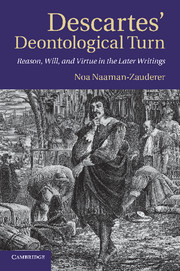Book contents
3 - Free will
Published online by Cambridge University Press: 10 January 2011
Summary
The Lord has made three marvels: something out of nothing; free will; and God in Man.
(Descartes, Early Writings, AT x 218: CSM i 5)The previous chapter presented Descartes' notion of error as a misuse of free will in the context of his deontological perspective. My concern in this chapter is to analyze his position on the essence of human free will, as a basis for the next chapter's discussion of Descartes' doctrine that it is in virtue of the will rather than the intellect, that we understand ourselves to be godlike. This doctrine, which dominates Descartes' writings from the Meditations onward, appears in its most radical form in the Fourth Meditation, where he states that the will of God “does not seem any greater” than the human will “when considered as will in the essential and strict sense” (AT vii 57: CSM ii 40). A close examination of Descartes' position on the essence of freedom is thus the key to our understanding of the superiority of our will as the most remarkable manifestation of our similitude to God.
FREE WILL IN THE FOURTH MEDITATION
A fundamental theme in Descartes' discussion of error in the Fourth Meditation is that God has endowed him with an infinite power of will that “is both extremely ample and also perfect of its kind” (AT vii 58: CSM ii 40).
- Type
- Chapter
- Information
- Descartes' Deontological TurnReason, Will, and Virtue in the Later Writings, pp. 101 - 130Publisher: Cambridge University PressPrint publication year: 2010

